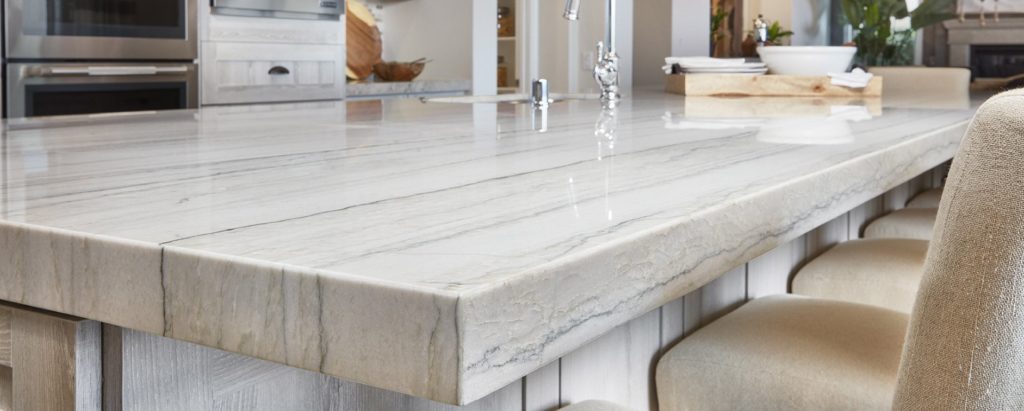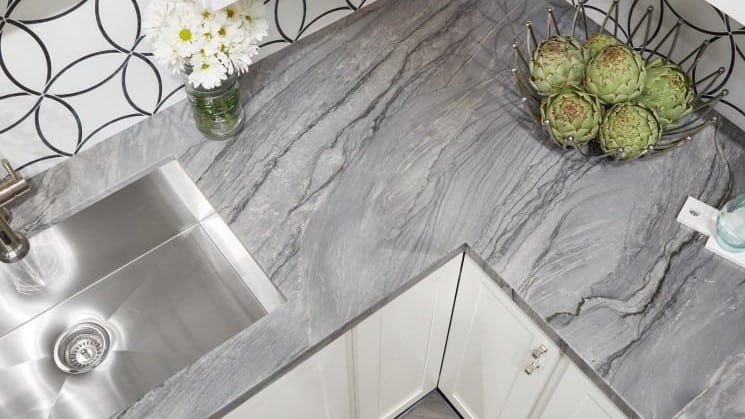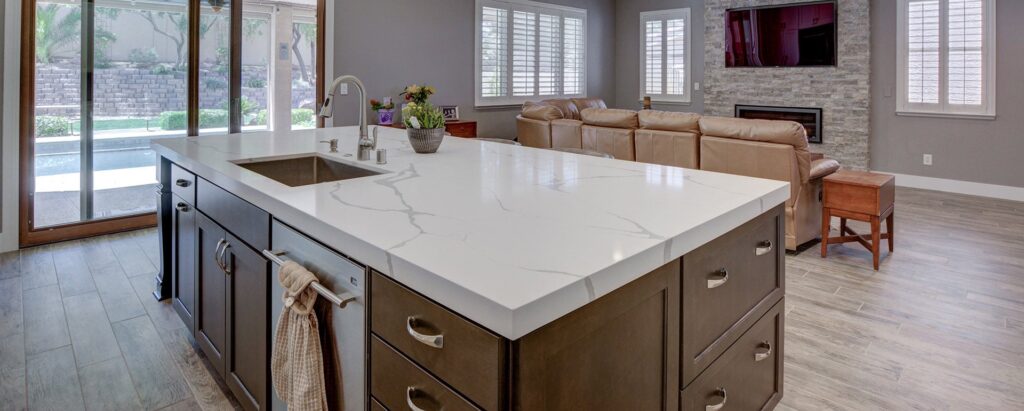
What’s in a name? With only a three-letter difference, it might be easy to confuse these two options in countertop material, but are they really so similar? In truth, quartzite and quartz are very different media, and both are viable options when considering your next countertop installation. Keeping things civil, let’s take a minute to compare: quartzite vs. quartz.
Natural vs. Engineered
Quartzite is natural stone, formed when sandstone or chert rich with quartz crystals is pressurized. It is a more eco-conscious option than quartz, which is engineered. Though the exact manufacturing process varies, quartz countertops are formed by a combination of quartz crystals, resins, pigments, and other additives like glass being pressed, cured, heated, and polished.
Appearance and Color
Beauty is in the eye of the beholder. If you are looking for hues of white or a soft gray with hints of pink, gold, or brown, quartzite may be the right fit. Its neutral appearance is often mistaken for granite or marble. If, on the other hand, you want bolder or more unique hues, quartz can deliver. As pigments can be added as part of its manufacturing process, quartz can be found in a host of color schemes, anything from mild blues to vibrant orange.
The shape of the countertop should also be kept in mind when balancing quartzite vs. quartz. Quartzite’s porous nature does not lend itself to being cut into unique shapes. Quartz is easier to cut and install in non-uniform spaces.

Durability and Resilience
In the contest of quartzite vs. quartz, it is clear that they are both tough cookies. Quartz is nonporous and very durable, a solid seven on the Moh’s mineral hardness scale. We don’t recommend throwing out the cutting board, though. Cutting directly on quartz can cause etching in the countertop by the acids in the foods being cut.
Quartzite is even harder, sitting closer to eight on the hardness scale, and more scratch resistant. It is also, however, more prone to crack when cutting out slabs. This is due to its porosity; more gaps form in the stone during its slow formation. This also makes quartzite less dense than quartz and means that it requires sealing with polyurethanes, acrylic, or wax. The sealing must be replaced regularly, especially for countertops in the kitchen. This usually means once or even twice a year. This is a facet of all natural stone, including granite and marble.
When it comes to heat, it is always best to use a trivet or hot pad under hot dishes and pans. That being said, the very nature of quartzite, formed by pressure and heat, makes it resistant to damage by heat. However, the resin in quartz is prone to melt at temperatures about 300 degrees Fahrenheit, so setting a scalding pot on a quartz countertop could leave scorch marks.
Get Down to Brass Tax
If the winner of quartzite vs. quartz comes down to the price, here are a few things to consider. The materials themselves are similarly priced. At time of writing, quartzite estimates range from $60 to over $100 per square foot, with quartz ranging from $60 to $150. Many also recommend buying extra quartzite in case damage is accrued during installation.
On that note, both types of stone are heavier than other countertop materials like laminate, making them unideal for DIY counter installation. Quartzite is also prone to breaking if cut imprecisely. We recommend professional installation. Out of the Woods is here for you with suggestions on choosing the right installer for your counters.

Cleaning and Care
The cleaning regime for both kinds of stone is similar. It is important to avoid abrasive cleaners; water and dish detergent should be sufficient. When wiping down countertops, keep in mind that even with its seal, quartzite can have a slightly granular texture. For particularly tough stains in quartzite, you might try a bit of ammonia mixed with hydrogen peroxide, 12% or less.
Still undecided, quartzite vs. quartz? We get it—both are great choices! There is no need to stand on the sidelines deliberating, though. Our experts here at Out of the Woods are dedicated to help find the countertops that will make you the real winner.

Follow Us